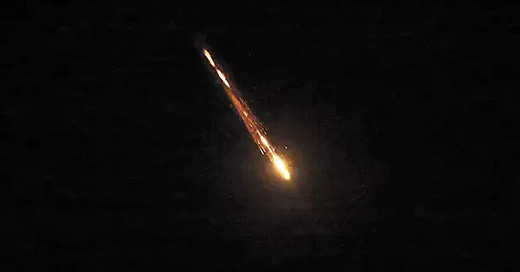A week ago, as the anticipated Iranian attack on Israel loomed, I wrote an op-ed for the Israeli daily Yediot Aharonot on the preferred military response. The article attracted attention for saying frankly—with clarity—the thoughts of a great many Israelis. The following is an adaptation of that piece.
In response to Iran’s impending retaliatory attack against Israel, the United States has significantly augmented its military presence in the Middle East. In addition to aircraft carriers, destroyers, and submarines, the Biden Administration has dispatched F-22 Raptor Fighters to the area. US air bases as far away as Michigan and North Carolina have been placed on high alert.
The purpose of these deployments is to prevent Iran and its proxies from triggering a regional war into which the US could be drawn. To this end, American forces will act as they did in the First Gulf War in 1991 and, most recently, during the Iranian missile attack of April 14th, intercepting missiles aimed at Israel. Without such a shield, the administration has reasoned, Israel would be compelled to respond massively. Iran’s reply would be more devastatingly still, igniting an all-out war.
There are two problems with this approach. The first is a matter of numbers. Hezbollah, alone, is capable of firing an estimated 6,000 rockets a day at Israel. Added to that must be the missiles and drones launched by Iranian-backed militias in Iraq, Syria, and Yemen. Israel’s multi-layered air defense systems, even when augmented by those of the United States and other allies, is unlikely to intercept all these projectiles. Enough of them could penetrate that shield and cause the degree of damage that would necessitate the very Israeli response the White House seeks to preempt.
The second problem is strategic. No one has ever won a ballgame by merely playing defense. The successful intervention of 350 Iranian missiles and drones on April 14 was not, as President Biden defined it, “a win,” but rather “a non-lose.” It did nothing to deter Iran and, in fact, might have helped it to better understand—and more effectively evade—Israel’s defenses. Eager to remove the humiliation of its failed assault but prepared to attempt a more successful one, Iran is likely to launch an even larger strike in the future.
For both of these problems, there is one simple solution. It will foster stability in the Middle East and restore America’s role as the preeminent world power. It will guarantee President Biden a legacy of courage and vision. But to accomplish all that, America must not merely join in the defense against Iran. America must lead the attack.
Such an operation would last not days but hours. Carrying 50,000-lb bombs far too big for our F-15s and F-35s, flying at heights unreachable by Iranian anti-aircraft and undetected by radar, America’s long-range strategic bombers—B52s, B1s, B2s—can eliminate Iranian nuclear facilities and essential utilities in a single night. Much as President Reagan retaliated for Iranian attacks on Kuwaiti tankers in 1988, destroying dozens of Iranian oil refineries in the Persian Gulf, US warships of the Fifth and Sixth Fleets could once again set those installations ablaze. Lacking an air force, an armored corps, or a sizable navy, Iran could not mount a serious counteroffensive against the United States. At most it could launch terror strikes against American targets across several continents, but it is doing that anyway as the world’s largest state sponsor of terror.
By attacking Iran, the United States will disabuse it of the belief that it will never have to pay a price for its aggression against Israel, American forces in the Middle East, or international shipping in the Bab al-Mandeb Straits. Our common enemies will no longer be able to conclude that a rift between the US and its Middle East allies is inevitable and that time is working on their side. Deprived of their Iranian backers, Hamas leaders will be further pressed to return to the negotiating table and agree to release Israeli hostages.
Most significantly, perhaps, by leading the attack on Iran, the United States will restore its position as the preeminent world power, overshadowing the defeats in Iraq and Afghanistan. It will send an unequivocal message to Russia and China about America’s commitment to Ukraine and Taiwan. An American attack on Iran will also open unprecedented paths to peace. It is important to recall that the two US-led peace conferences in the past – in Madrid in 2002 and in Annapolis in 2007– were both preceded by the large-scale use of American military force in the Middle East. So, too, could the United States, having eliminated the greatest obstacle to peace in the region, announce a major diplomatic campaign to expand the Abraham Accords and even address the Israeli-Palestinian conflict.
By authorizing an attack on Iran President Biden can assure himself a legacy of valor and leadership and set an example for future administrations–Democratic and Republican alike–to follow. America would not have to be made great again. The peoples of the Middle East—indeed of the entire world—would see an America that is great right now.




Not gonna happen. Biden is checked out and his staff is led by Obama’s pro-Iran holdovers. Harris is 100% focused on the election. To that end, she is determined to placate the pro-Hamas fringe to secure a lead in Michigan.
Not only is there zero chance this will ever happen, the very idea of it is unthinkable to the Biden administration which doesn't view Iran as a font of evil but as a wayward child to be bribed and pleaded with.